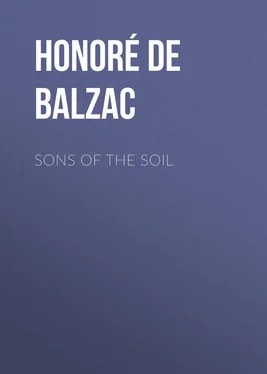Honoré Balzac - Sons of the Soil
Здесь есть возможность читать онлайн «Honoré Balzac - Sons of the Soil» — ознакомительный отрывок электронной книги совершенно бесплатно, а после прочтения отрывка купить полную версию. В некоторых случаях можно слушать аудио, скачать через торрент в формате fb2 и присутствует краткое содержание. Жанр: literature_19, foreign_antique, foreign_prose, на английском языке. Описание произведения, (предисловие) а так же отзывы посетителей доступны на портале библиотеки ЛибКат.
- Название:Sons of the Soil
- Автор:
- Жанр:
- Год:неизвестен
- ISBN:нет данных
- Рейтинг книги:5 / 5. Голосов: 1
-
Избранное:Добавить в избранное
- Отзывы:
-
Ваша оценка:
- 100
- 1
- 2
- 3
- 4
- 5
Sons of the Soil: краткое содержание, описание и аннотация
Предлагаем к чтению аннотацию, описание, краткое содержание или предисловие (зависит от того, что написал сам автор книги «Sons of the Soil»). Если вы не нашли необходимую информацию о книге — напишите в комментариях, мы постараемся отыскать её.
Sons of the Soil — читать онлайн ознакомительный отрывок
Ниже представлен текст книги, разбитый по страницам. Система сохранения места последней прочитанной страницы, позволяет с удобством читать онлайн бесплатно книгу «Sons of the Soil», без необходимости каждый раз заново искать на чём Вы остановились. Поставьте закладку, и сможете в любой момент перейти на страницу, на которой закончили чтение.
Интервал:
Закладка:
The rascal was continually poaching, and with nothing to fear from it. The intimacies of his wife with Gaubertin and the keepers and the rural authorities, together with the laxity of the times, secured him impunity. As soon as his children were large enough he made them serviceable to his comfort, caring no more for their morality than for that of his wife. He had two sons and two daughters. Tonsard, who lived, as did his wife, from hand to mouth, might have come to an end of this easy life if he had not maintained a sort of martial law over his family, which compelled them to work for the preservation of it. When he had brought up his children, at the cost of those from whom his wife was able to extort gifts, the following charter and budget were the law at the Grand-I-Vert.
Tonsard’s old mother and his two daughters, Catherine and Marie, went into the woods at certain seasons twice a-day, and came back laden with fagots which overhung the crutch of their poles at least two feet beyond their heads. Though dried sticks were placed on the outside of the heap, the inside was made of live wood cut from young trees. In plain words, Tonsard helped himself to his winter’s fuel in the woods of Les Aigues. Besides this, father and sons were constantly poaching. From September to March, hares, rabbits, partridges, deer, in short, all the game that was not eaten at the chateau, was sold at Blangy and at Soulanges, where Tonsard’s two daughters peddled milk in the early mornings, – coming back with the news of the day, in return for the gossip they carried about Les Aigues, and Cerneux, and Conches. In the months when the three Tonsards were unable to hunt with a gun, they set traps. If the traps caught more game than they could eat, La Tonsard made pies of it and sent them to Ville-aux-Fayes. In harvest-time seven Tonsards – the old mother, the two sons (until they were seventeen years of age), the two daughters, together with old Fourchon and Mouche – gleaned, and generally brought in about sixteen bushels a day of all grains, rye, barley, wheat, all good to grind.
The two cows, led to the roadside by the youngest girl, always managed to stray into the meadows of Les Aigues; but as, if it ever chanced that some too flagrant trespass compelled the keepers to take notice of it, the children were either whipped or deprived of a coveted dainty, they had acquired such extraordinary aptitude in hearing the enemy’s footfall that the bailiff or the park-keeper of Les Aigues was very seldom able to detect them. Besides, the relations of those estimable functionaries with Tonsard and his wife tied a bandage over their eyes. The cows, held by long ropes, obeyed a mere twitch or a special low call back to the roadside, knowing very well that, the danger once past, they could finish their browsing in the next field. Old mother Tonsard, who was getting more and more infirm, succeeded Mouche in his duties, after Fourchon, under pretence of caring for his natural grandson’s education, kept him to himself; while Marie and Catherine made hay in the woods. These girls knew the exact spots where the fine forest-grass abounded, and there they cut and spread and cocked and garnered it, supplying two thirds, at least, of the winter fodder, and leading the cows on all fine days to sheltered nooks where they could still find pasture. In certain parts of the valley of Les Aigues, as in all places protected by a chain of mountains, in Piedmont and in Lombardy for instance, there are spots where the grass keeps green all the year. Such fields, called in Italy “marciti,” are of great value; though in France they are often in danger of being injured by snow and ice. This phenomenon is due, no doubt, to some favorable exposure, and to the infiltration of water which keeps the ground at a warmer temperature.
The calves were sold for about eighty francs. The milk, deducting the time when the cows calved or went dry, brought in about one hundred and sixty francs a year besides supplying the wants of the family. Tonsard himself managed to earn another hundred and sixty by doing odd jobs of one kind or another.
The sale of food and wine in the tavern, after all costs were paid, returned a profit of about three hundred francs, for the great drinking-bouts happened only at certain times and in certain seasons; and as the topers who indulged in them gave Tonsard and his wife due notice, the latter bought in the neighboring town the exact quantity of provisions needed and no more. The wine produced by Tonsard’s vineyard was sold in ordinary years for twenty francs a cask to a wine-dealer at Soulanges with whom Tonsard was intimate. In very prolific years he got as much as twelve casks from his vines; but eight was the average; and Tonsard kept half for his own traffic. In all wine-growing districts the gleaning of the large vineyards gives a good perquisite, and out of it the Tonsard family usually managed to obtain three casks more. But being, as we have seen, sheltered and protected by the keepers, they showed no conscience in their proceedings, – entering vineyards before the harvesters were out of them, just as they swarmed into the wheat-fields before the sheaves were made. So, the seven or eight casks of wine, as much gleaned as harvested, were sold for a good price. However, out of these various proceeds the Grand-I-Vert was mulcted in a good sum for the personal consumption of Tonsard and his wife, who wanted the best of everything to eat, and better wine than they sold, – which they obtained from their friend at Soulanges in payment for their own. In short, the money scraped together by this family amounted to about nine hundred francs, for they fattened two pigs a year, one for themselves and the other to sell.
The idlers and scapegraces and also the laborers took a fancy to the tavern of the Grand-I-Vert, partly because of La Tonsard’s merits, and partly on account of the hail-fellow-well-met relation existing between this family and the lower classes of the valley. The two daughters, both remarkably handsome, followed the example of their mother as to morals. Moreover, the long established fame of the Grand-I-Vert, dating from 1795, made it a venerable spot in the eyes of the common people. From Conches to Ville-aux-Fayes, workmen came there to meet and make their bargains and hear the news collected by the Tonsard women and by Mouche and old Fourchon, or supplied by Vermichel and Brunet, that renowned official, when he came to the tavern in search of his practitioner. There the price of hay and of wine was settled; also that of a day’s work and of piece-work. Tonsard, a sovereign judge in such matters, gave his advice and opinion while drinking with his guests. Soulanges, according to a saying in these parts, was a town for society and amusement only, while Blangy was a business borough; crushed, however, by the great commercial centre of Ville-aux-Fayes, which had become in the last twenty-five years the capital of this flourishing valley. The cattle and grain market was held at Blangy, in the public square, and the prices there obtained served as a tariff for the whole arrondissement.
By staying in the house and doing no out-door work, La Tonsard continued fresh and fair and dimpled, in comparison with the women who worked in the fields and faded as rapidly as the flowers, becoming old and haggard before they were thirty. She liked to be well-dressed. In point of fact, she was only clean, but in a village cleanliness is a luxury. The daughters, better dressed than their means warranted, followed their mother’s example. Beneath their outer garment, which was relatively handsome, they wore linen much finer than that of the richest peasant women. On fete-days they appeared in dresses that were really pretty, obtained, Heaven knows how! For one thing, the men-servants at Les Aigues sold to them, at prices that were easily paid, the cast-off clothing of the lady’s-maids, which, after sweeping the streets of Paris and being made over to fit Marie and Catherine, appeared triumphantly in the precincts of the Grand-I-Vert. These girls, bohemians of the valley, received not one penny in money from their parents, who gave them food only, and the wretched pallets on which they slept with their grandmother in the barn, where their brothers also slept, curled up in the hay like animals. Neither father nor mother paid any heed to this propinquity.
Читать дальшеИнтервал:
Закладка:
Похожие книги на «Sons of the Soil»
Представляем Вашему вниманию похожие книги на «Sons of the Soil» списком для выбора. Мы отобрали схожую по названию и смыслу литературу в надежде предоставить читателям больше вариантов отыскать новые, интересные, ещё непрочитанные произведения.
Обсуждение, отзывы о книге «Sons of the Soil» и просто собственные мнения читателей. Оставьте ваши комментарии, напишите, что Вы думаете о произведении, его смысле или главных героях. Укажите что конкретно понравилось, а что нет, и почему Вы так считаете.












